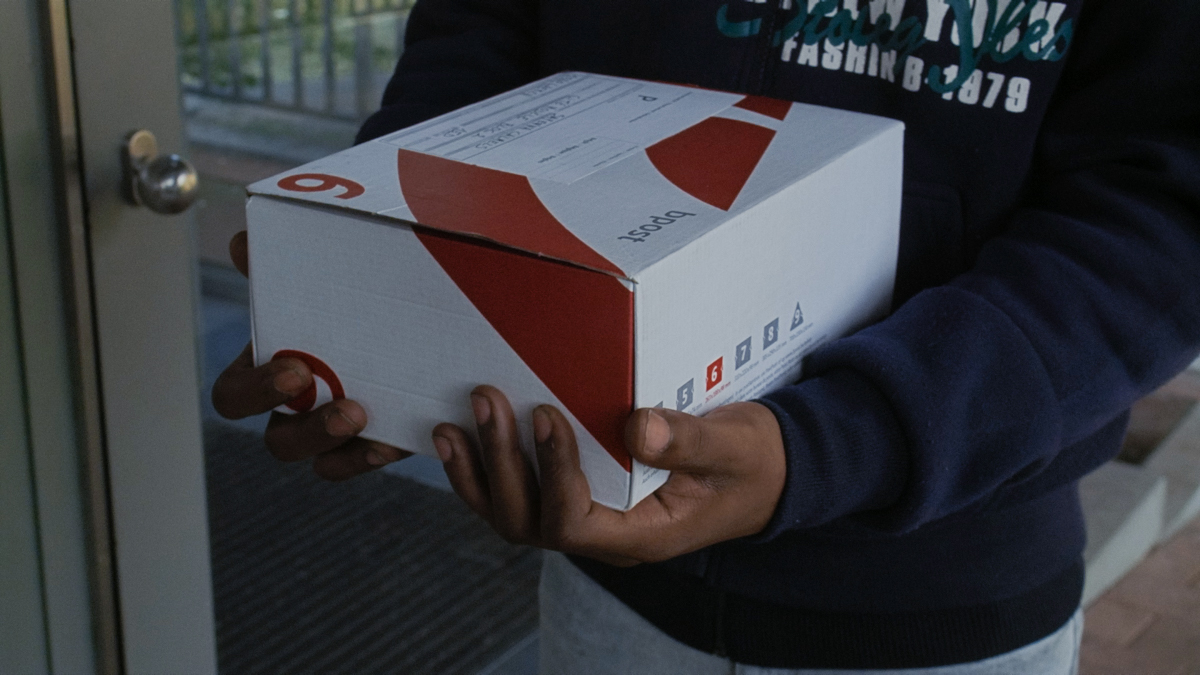Dear Addressee
On Etangs Noirs (Timeau De Keyser & Pieter Dumoulin, 2018)

The face of Jimi (Cédric Luvuezo) lightens in the dark. It is a face that listens, that watches, that goes around in the night to look for Sayenna Calmels and to give her the package that was delivered to him by mistake. He is serious about his task as messenger and will not rest before he finds Sayenna. Jimi rings the doorbells of his neighbours in the apartment building to ask where he might find her. He walks down the gallery until he arrives at the door of Benny, who invites Jimi in to help him catch his escaped parakeets.
What follows reminds us of the moment in The Birds (Alfred Hitchcock, 1963) when Melanie pretends she is the saleswoman of a bird store in order to impress Mitch, on whom she has a secret crush. When she tries to take a lovebird from its cage, it escapes and causes a happy chaos. It flutters among the cages full of multicoloured birds, just out of reach of Melanie’s red-painted nails. Eventually, it is caught under the sweetheart’s black hat. The bird is caught, Melanie’s heart won over.
Neighbour Benny’s parakeets are a pretext for rapprochement too. Jimi reluctantly agrees to help, as if he suspects that he could disappear under a hat himself. The hands of both men reach into the air and brush against the birds’ feathers. The camera follows their flight and caresses Benny’s room. The walls are hung with pictures, little paintings and souvenirs, revealing a life that used to hide behind the front door. But as soon as the little animals are back inside their cages and the cages are locked, Jimi has flown in order to knock on other windows and doors; it's as if he wants to reach the backside of all those shiny surfaces. He feels trapped by Benny, while his heart has already been won over by Sayenna’s package. This is not about love, but rather about passion. Sometimes passions are inexplicable.
Delivering the package becomes an increasingly heavy weight on Jimi's shoulders. Still, the package swings and bounces in a feather-light blue plastic bag. Weightless, it lies on his lap. His holding it with both hands is out of dedication to his task rather than because it would be too heavy for just one hand. The longer he wanders around, the more it strikes us how light the package is, how empty. The emptiness of the box becomes increasingly apparent as the film’s weighty weightless core.
The box is a true MacGuffin, a term used by Alfred Hitchcock to indicate the object that drives the plot without ever showing its intrinsic meaning. The object is the film’s centre of gravity; and just like gravity, it influences its surroundings without ever becoming visible. Even without an inner self, the object is capable of directing reality.
But what is inside this weightless MacGuffin? It is filled with the imagination of the spectator. It is up to us to fill the box, the way words in a book are filled up with reality. An intimate link is forged between our commitment to the film and the slender fingers cherishing rather than lifting the box. Our dedication is protected by Jimi. Maybe that is the reason we love to look at his face.

